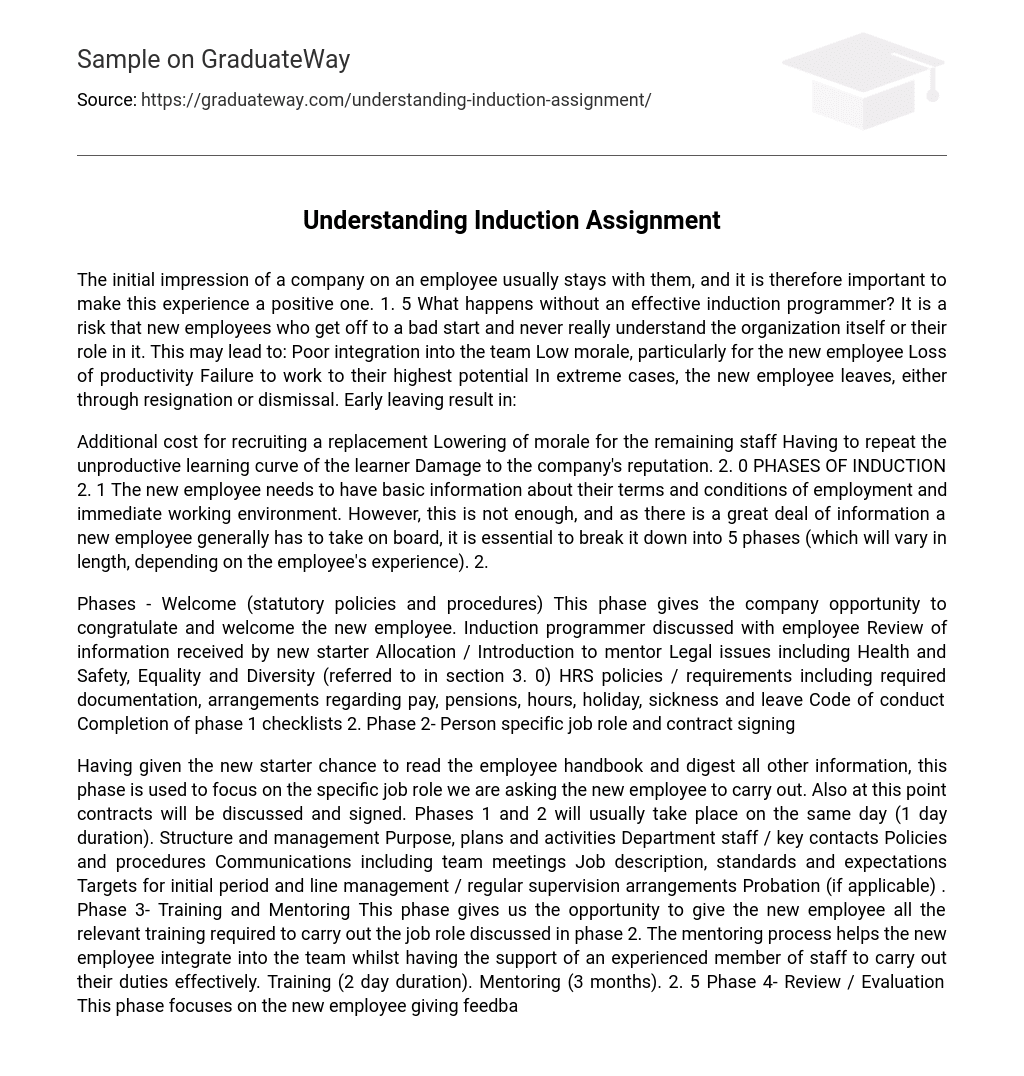PHASES OF INDUCTION
The new employee needs to have basic information about their terms and conditions of employment and immediate working environment. However, this is not enough, and as there is a great deal of information a new employee generally has to take on board, it is essential to break it down into 5 phases (which will vary in length, depending on the employee’s experience).
- Phases 1 – Welcome (statutory policies and procedures) This phase gives the company opportunity to congratulate and welcome the new employee. Induction programmer discussed with employee Review of information received by new starter Allocation / Introduction to mentor Legal issues including Health and Safety, Equality and Diversity (referred to in section 3. 0) HRS policies / requirements including required documentation, arrangements regarding pay, pensions, hours, holiday, sickness and leave Code of conduct Completion of phase 1 checklists 2.
- Phase 2- Person specific job role and contract signing Having given the new starter chance to read the employee handbook and digest all other information, this phase is used to focus on the specific job role we are asking the new employee to carry out. Also at this point contracts will be discussed and signed. Phases 1 and 2 will usually take place on the same day (1 day duration). Structure and management Purpose, plans and activities Department staff / key contacts Policies and procedures Communications including team meetings Job description, standards and expectations Targets for initial period and line management / regular supervision arrangements Probation (if applicable) .
- Phase 3- Training and Mentoring This phase gives us the opportunity to give the new employee all the relevant training required to carry out the job role discussed in phase 2. The mentoring process helps the new employee integrate into the team whilst having the support of an experienced member of staff to carry out their duties effectively.
- Phase 4 – Review / Evaluation This phase focuses on the new employee giving feedback on the induction process and how if appropriate it could be improved. All planned elements of induction have been completed. The mentoring process can be reviewed and continued if appropriate How effective the induction process has been from the inductees point of view Feedback from the line manager and mentor has been provided on performance, achievements and development areas / needs.
- Phase 5 – Follow up training Continual professional development is important because it ensures that all our employees continue to be competent in their work. (Indefinite)
LEGAL ASPECTS OF AN INDUCTION
Many organizations are unaware that there is statutory legislation that should e included within an induction process. It is important to ensure that new employees do not simply start in their new roles without being informed of the health and safety procedures of the company in general and their specific role. All aspects of health and safety are to be given to the employee in writing in the form of the employee hand book.
As a company we have a legal responsibility to ensure that no unlawful discrimination occurs in the recruitment process and the career of an employee on the grounds of: Age Disability Gender Reassignment Marriage and civil partnership Pregnancy and maternity Race Religion or belief Sex and sexual orientation
The Data Protection Act is concerned with respecting the rights of individuals when processing their personal information. This can be achieved by being pen and honest with employees about the use of information about them and by following good data handling procedures. The act is mandatory and we must comply with the following 8 principles. Personal data should be process fairly and lawfully Data should be obtained only for one or more specified and lawful purposes The data should be adequate, relevant and not excessive It should be accurate and where necessary kept up to date And data should not be kept for longer than necessary Personal data should be processed in accordance with the individuals rights under the act Data should be kept secure
Personal data should not be transferred outside the European Economic Areas unless the country offers adequate data protection. All staff have responsibilities under the Act to ensure that their activities comply with the Data Protection Principles. Line managers have responsibility for the type of personal data they collect and how they use it. Staff should not disclose personal data outside the organization’s procedures, or use personal data held on others for their own purposes. All employees have a legal right to access information that we may hold on them.
It is vital that this is explained from the very beginning of an employee’s career. As an employer we need to know when a member of staff is off for short term or long term sickness to allow us to provide relevant cover (if required). The presence of a formal procedure also protects the employee from any disciplinary procedures if they follow it. This information is covered within the employee handbook.





